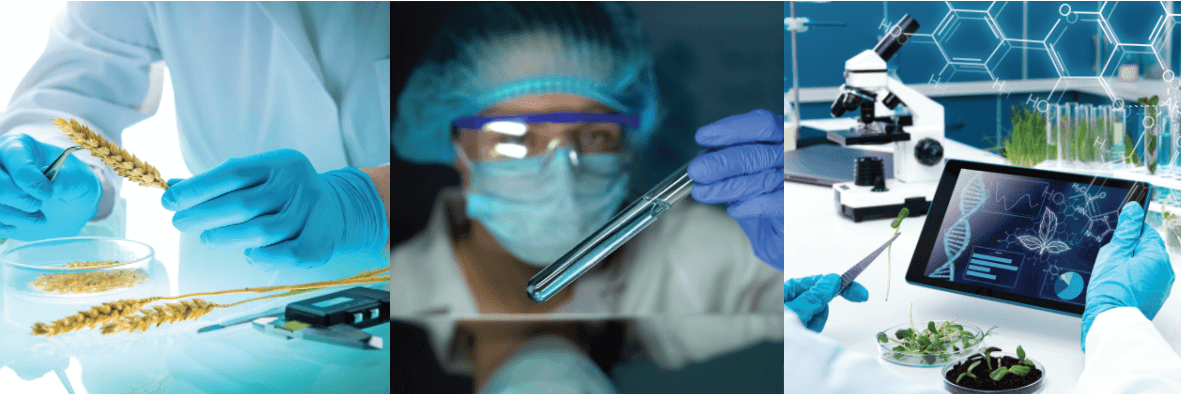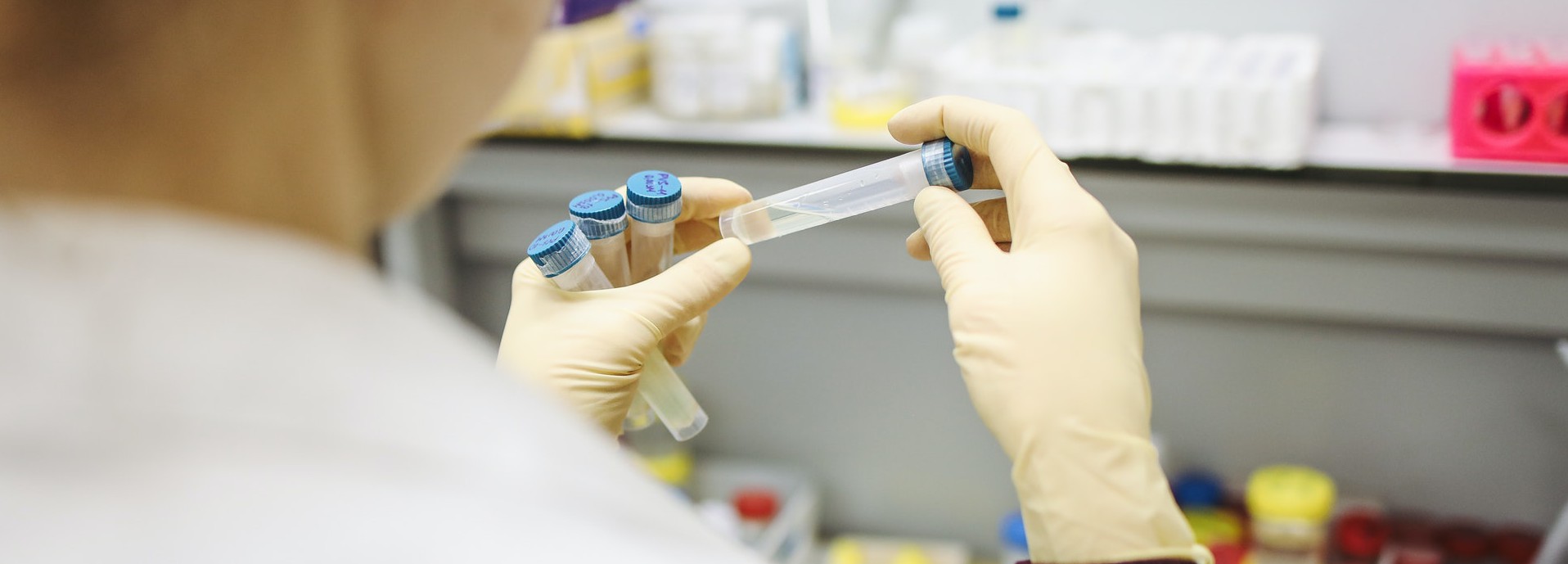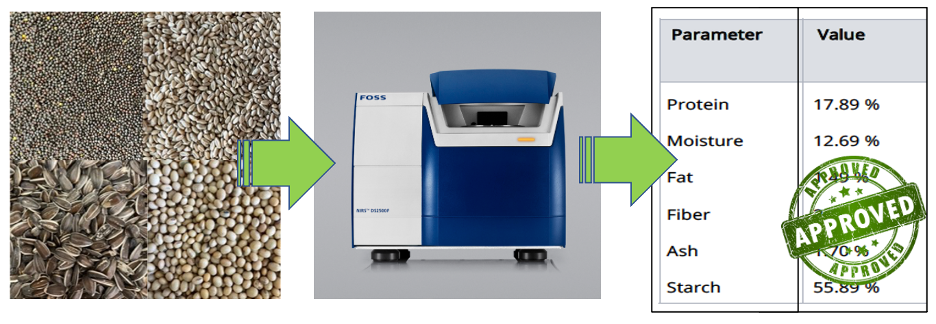
Laboratory Service Division
Soil/Tissue Testing
Our soil and tissue testing services provide you with a thorough chemical, physical and biological analysis of your fields, dividing them into sampling zones based on soil classifications. Our lab provides data such as clay, silt/sand content, organic matter, available plant elements, nutrient levels, and salinity. Our analyses provide you with the information you need to manage high or low-productivity zones in your fields.
In addition, our homogeneous compound fertilizer formulation for spring application solves the problem of different particle sizes in a fertilizer mix, replacing it a better solution; a single particle infused with our customized analysis of N, P, K, and S. Macronutrients are chelated with our binding agent, which can help improve absorption under the right conditions. The results include:
• less fertilizer required
• excellent crush strength, low dust content and easy handling
Benefits of Soil / Tissue Test Results
- The results provided will allow the assessment of spore distribution to determine the risk spots across the fields.
- Detection of pathogen infestations at the earlier stage will help reduce the severity and impact of the disease and minimize crop/ plant yield loss.
- The feedback from the farmers (customers) on the questioner for the risk re-assessment checklist along with in-house weather forecast will be used to determine the disease risk.
- Custom feedbacks with suggestions to include crop treatment based on the information gathered from the testing results and modelling results to prevent the spread of crop/plant disease.
Disease Testing
Our soil testing service can identify and quantify pathogens for various crop diseases at specific locations in your fields, detecting risk spots quickly and enabling us to make suggestions for treatment at an early stage. We employ quality control protocols to eliminate false results, and our testing methods have been rigorously evaluated
Testing Kits

Test soil/tissue samples for the presence of pathogens for various disease to minimize the risk of future yield loss.
We provide a paramount soil testing platform that includes the identification and quantification of pathogens for various crop/plant diseases such as (Ascochyta blight, Black leg, Clubroot, Chocolate spot, Fusarium, Sclerotinia stem rot, Root rot, Verticillium stripe, White rust, White leaf spot, Grey stem, etc.).
Detection of pathogen infections at the early stage will help reduce the severity and impact of the diseases and minimize crop/plant yield loss.
We test soil and plant tissue to determine the pathogen level, provide the assessment of spore distribution and indicate the risk spots in your fields. In addition, we suggest whether to apply any treatment to your crop or implement proactive management strategies to prevent the spread of crop/plant diseases
Pathogen Testing Service
- Our paramount testing platform includes the identification and quantification of pathogens for various diseases.
- Our developed method identifies the exact spore count in very low levels (~100 – 500 spores/0.25 g) to high levels of pathogen infections in soil, root and crop tissues.
- The advanced international set-up of real-time PCR (qPCR) generates high-quality data which is highly specific to individual pathogens.
- We use custom primers and probes with improved purification and extraction methods, under specific guidelines to accomplish pathogen detection in rapid time.
- Our quality control protocols include control samples, instrument blank and method blank to confirm no cross-contamination and eliminate non-specific/false results.
- Our testing methods have been rigorously evaluated for detection limit, accuracy, precision, repeatability and reproducibility.
List of Pathogens Tested
| Disease | Pathogens |
| Ascochyta blight | Fungal species of Ascochyta |
| Black leg | Fungal species of Leptosphaeria |
| Clubroot | Fungal species of Plasmodiophora |
| Chocolate spot | Fungal species of Botrytis |
| Fusarium head blight | Fungal species of Fusarium |
| Sclerotinia stem rot (white mould) | Fungal species of Sclerotinia |
| Root rot | Fungal species of Rhizoctonia, Pythium |
| Verticillium stripe | Fungal species of Verticillium |
| White leaf spot and grey stem | Fungal species of Mycosphaerella |
| White rust (stag head) | Fungal species of Albugo |
Seed/Grain Testing Services

Test your seed samples for confirmation of its nutrient density.
Our lab is equipped with a state-of-the-art Near Infrared Spectrometer that provides quick and dependable estimates of the nutritional characteristics and compositions for a wide range of oilseeds and grains, and different types and forms of food products such as flour, and dried and ground samples. The Spectrometer has access to a database that generates more precise and reliable data for each of the nutritional parameters.
The testing service delivers the information you need to meet the nutrient standards set by individual nations, and also includes suggestions from nutritional experts. Our analysis also ensures that the grain you produce or sell is in compliance with Canadian regulations. These tests, and the information provided, give you and potential buyers a complete and accurate evaluation of the market value of your grain.
In addition, our on-farm analysis will help you determine in real-time whether to mix or separate your grain, store it or sell it, or use it for animal feed.
Grain or seed testing service:
- The instrument carries out quick and dependable estimate on the nutritional characteristics/compositions for a multitude of food product such as: Wheat, Barley, Oat, Canola Seed, Soyabean Seed, Sunflower Seed, Peas, Corn, Rye lentils etc.
- Different types and forms of food product such as: seeds, grains, flour, dried and ground samples can be easily analyzed in no-time.
- Limited sample requirement and no additional reagents or chemical used during the sample analysis.
- Our database is updated regularly to generate more precise and reliable data for each of the nutritional parameters.
- The testing service includes independent, globally trusted test results which includes suggestions from nutritional experts.
- The service delivers the essential parameters to execute and report the testing with acceptable levels of nutrients set by individual nations.
- The analysis data ensures the grain you produce or sell, compliance with under Canadian regulations.
- Our nutritional analysis includes proximate analysis of fats, carbohydrates, protein, fiber, sugars, vitamins, minerals, and trace elements etc.
Benefits to Farmers/Customers:
- On-farm grain analysis will evaluate your grain and field’s quality in real time to evaluate whether to mix or separate grain.
- The results provided will allow to maximise returns on your harvest for greatest grain quality.
- The report of grain analysis is the final approval to determine, which grain is of highest quality.
- No misinterpretation is risked and giving confidence to buyers to match the true market value of your grain.
- In addition, the grain analysis will determine to store or sell gain, or which grain to be used for animal feed.